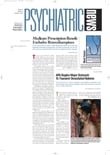Detailed questions organized by body systems get parents and children to report more adverse effects of pediatric psychotropic drugs than do brief general inquiries, according to a new study.
“A specific but comprehensive assessment of adverse effects by body system in pediatric psychopharmacology seems to yield additional clinically useful information relevant to the safe use of medications in children,” wrote Laurence Greenhill, M.D., and colleagues in the December 2004 Journal of the American Academy of Child and Adolescent Psychiatry.
Research into how adverse events of psychotropic drugs differ in children compared with adults has been gathering momentum for the last decade, said Daniel Pine, M.D., of the National Institute of Mental Health in Bethesda, Md.
“The effects of drugs are likely to be different, but the reasons are poorly understood,” said Pine. “Any new data on how to elicit information about adverse events from parents or children is an important first step.”
Adverse events are often reported spontaneously, especially in industry-sponsored trials, where uniform general inquiry questions are rarely required, said the authors. More structured ways of asking about side effects might lead to more complete knowledge of adverse events and their prevention.
Greenhill and colleagues administered the Safety Monitoring Uniform Report Form (SMURF) to 59 children, aged 6 to 18, or their parents. Three segments of the test were administered sequentially. The three general inquiry questions took an average of 4.3 minutes, the 18 drug-specific questions required 4.2 minutes, and the 24 questions based on specific body systems averaged 15.5 minutes to complete.
The 59 patients or their parents reported a total of 195 discrete adverse events in all segments of the study. Fifty (26 percent) of all events were revealed in the general inquiry stage, using such questions as, “Have you had any health problems since your last visit?” Sixteen (8 percent) adverse events came out in the drug-specific questioning, which asked about side effects known to occur with use of a particular drug. However, 129 (66 percent) adverse events appeared only as a result of the comprehensive body-system review. That approach focused on individual organs, asking about hearing, eyesight, mood, and so on.
Fifteen (31 percent) of the adverse events revealed in the general inquiry required some medical action, as did two (12 percent) from the drug-specific inquiry and 19 (15 percent) from the body-system review. Medical actions include dose changes, temporary or permanent suspension of drug use, increased surveillance, lab tests, or addition of a counteracting medication.
Although the body-systems review produced evidence for more adverse events, it also provoked sharply differing assessments by parents and clinicians, Greenhill reported.
Among the parents, 66 percent said it was “very useful,” 71 percent said the time involved was “just right,” and 80 percent considered the level of detail appropriate. In contrast, only 28 percent of clinicians agreed that it was very useful, 74 percent said it took too long to complete, and 70 percent found it too detailed.
Parents at three of the five sites participating in the study received small fees ($20 to $25) in exchange for the time they spent answering study questions. Their satisfaction ratings were higher than those of parents who were not paid. Only one-third of parents who were not paid logged positive ratings, a figure similar to those recorded by clinicians.
Time was the critical factor for harried clinicians. They spent a median two minutes on the general inquiry segment, another three minutes on the drug-specific query, and 14 minutes on the body-systems review. Since physicians are lucky to get 15 minutes with each patient, the current state of the SMURF makes it impractical so far for general use without further refinement, said Greenhill.
The researchers are looking at ways to cut the length of the test without compromising its ability to pick up adverse effects, possibly by eliminating the drug-specific section and cutting the number of body-systems questions. Having parents use computers to answer questions might take some of the burden off physicians and nurses, they suggested.
Once refined, the body-system review could detect important adverse effects missed by the general inquiry, especially when drugs are first tested.
“This finding has implications for those conducting clinical trials, especially trials of new psychotropic agents, where safety needs to be determined early in drug development,” he said.
The study was supported by two grants from the National Institute of Mental Health.
An abstract of “Comparison of Increasingly Detailed Elicitation Methods for the Assessment of Adverse Events in Pediatric Psychopharmacology” can be accessed online at<www.jaacap.com> by clicking on “Archives,” “December 2004,” and then the study title. ▪
